
New York/IBNS: Traditional storytellers in Chad, known as troubadours, are taking life-saving messages to remote communities in the Sahelian country, as the Government steps up its efforts with the support of the UN to counter the COVID-19 pandemic.
Some 80 troubadours - a medieval French term for wandering singers and poets who focused on courtly love - are now on the move to remote areas in eight provinces in Chad to raise awareness of the dangers of COVID-19 and what measures need to be taken to stop the spread of the deadly disease.
These traditional custodians of information typically travel from community to community on donkeys, horses or camels, sharing news in local languages.
Spreading the word
In a vast, yet scarcely populated country, where close to three-quarters of the population live in rural areas, with limited or non-existent access to radio, mobile or internet technologies, the role of these troubadours is crucial according to Violet Kakyomya, the UN Resident Coordinator in Chad, the UN’s most senior representative in the country.
“They are the most reliable people to deliver information by word-of-mouth”, adding that “it is essential to work with them in order to avoid miscomprehension that can quickly translate into rumors, misinformation and suspicion of health interventions.”
Radio is often used in Chad to provide health information and promote behaviour change, however, it doesn’t reach across the whole territory and many families are not wealthy enough to own a radio-set or buy batteries to power them. In this sense the communities the troubadours are reaching are truly off the grid.
Countering coronavirus misinformation
In addition to supporting the roll-out of troubadours across the country, the United Nations is also helping to improve peer-to-peer communication, both in urban and rural settings.
The UN has worked with the authorities in Chad to send 1,040 community workers to eight provinces to promote safe behaviours including social distancing and washing hands properly, and to counter the spread of misinformation about coronavirus or COVID-19.
These workers are chosen by the communities themselves and operate under the supervision of the Ministry of Health.
“Many people say that coronavirus cannot survive in the heat of Chad, so I tell them that this is not true and that there are already cases in our country,” says Amina Gomnalta, a social worker in the central district of N’Djamena, the capital of Chad. “I explain that coronavirus is a global pandemic and that here, at this stage, the most important thing is to protect ourselves and to protect others.”
Chad recorded its first case of coronavirus in mid-March and on 11 May, according to the World Health Organization, had some 320 cases with a total of 31 deaths.
More than 200,000 awareness posters have been placed in public buildings, markets, schools and health centers in 16 provinces. They encourage people to regularly wash their hands, to greet each other from a distance and to avoid touching their faces.
“I have nailed the posters on the door, in the hand washing station and in the waiting room of the health center”, says Amina Gomnalta. “Every morning I ask people to respect safety measures, while at the health center but also at home”, she adds.
Responsible reporting on COVID-19
The UN has been supporting the Government’s awareness efforts and the National Response Plan to address the socio-economic impact of COVID-19.
The United Nations is also working to prevent COVID-19 among displaced and crisis-affected populations.In urban settings, most people get their information from the television and radio. In N’Djamena, more than 60 journalists from state-owned, private and community media organizations have been trained since the onset of the health emergency on the importance of providing accurate and timely information. They have been guided on how to use reliable sources, the verification of facts and the identification of fake news.
Chad hosts the largest refugee population in the Sahel: close to half a million people that have fled violence in neighboring Sudan, Nigeria and the Central African Republic. Additionally, there are more than 200,000 internally displaced people around Lake Chad.
The UN’s World Food Programme (WFP) is continuing to provide emergency food assistance for the most vulnerable Chadians in both rural and urban settings.
Photo caption and credit: WFP/Tabam Mbatelham
In Chad, 80 troubadours travel to eight provinces to educate people in isolated regions to promote healthy habits and dispel any doubts about COVID-19
Support Our Journalism
We cannot do without you.. your contribution supports unbiased journalism
IBNS is not driven by any ism- not wokeism, not racism, not skewed secularism, not hyper right-wing or left liberal ideals, nor by any hardline religious beliefs or hyper nationalism. We want to serve you good old objective news, as they are. We do not judge or preach. We let people decide for themselves. We only try to present factual and well-sourced news.







